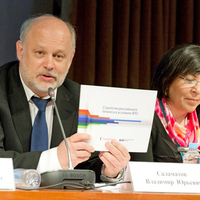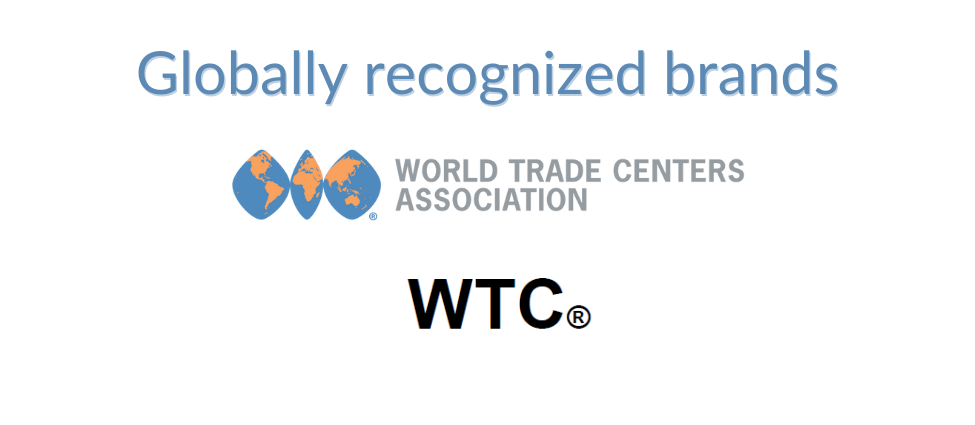
WTC Moscow at "Prospects of Economic Growth"

MOSCOW, RUSSIA - WTC Moscow organized the section “Prospects of stable economic growth within the framework of Eurasian integration” at the 2014 International Economic forum of the CIS member states in March. Panel discussion was moderated by Vladimir Salamatov – General Director of the World Trade Center Moscow and Chairman of the Committee of the Russian Chamber of Commerce and Industry of the Russian Federation for Economic Integration of the Shanghai Cooperation Organization and CIS Countries, Igor Suvorov – President of Interstate Bank, and Mikhail Yakunin – Senior Vice President of VTB Bank.
 Opening the meeting, Mr. Suvorov expressed hope that the work of the panel section will promote emergence of new integration incentives and initiatives. He stressed that Interstate Bank sees no alternative for the countries of the Uniform Economic Space (UES) other than taking part in development of integration processes and promoting them. “Countries of the UES should begin forming an area of economic stability in the CIS, which would be less susceptible to negative external factors, and special emphasis should be made on issues of collaboration in the currency and financial field,” – remarked the president of Interstate Bank. It’s important to identify the needs of different nations and to find the correct balance between national and supranational interests in that space, believes Mr. Suvorov.
Opening the meeting, Mr. Suvorov expressed hope that the work of the panel section will promote emergence of new integration incentives and initiatives. He stressed that Interstate Bank sees no alternative for the countries of the Uniform Economic Space (UES) other than taking part in development of integration processes and promoting them. “Countries of the UES should begin forming an area of economic stability in the CIS, which would be less susceptible to negative external factors, and special emphasis should be made on issues of collaboration in the currency and financial field,” – remarked the president of Interstate Bank. It’s important to identify the needs of different nations and to find the correct balance between national and supranational interests in that space, believes Mr. Suvorov.
A next development stage is coordination and harmonization of currency policies pursued by different nations, Mikhail Yakunin said with conviction. Another aspect is rapprochement of the legislations. It’s essential to harmonize them on a permanent basis, especially when interests of some countries diverge significantly.
 Vladimir Salamatov put an emphasis on one important factor that allows expanding mutual trade. That factor includes various integration processes taking place everywhere in the world. One of these processes turned out to be the largest in scale, which was setting up the World Trade Organization. The scale is indeed impressive: WTO member nations account for 98% of all international trade. 160 countries are united in 354 associations of all kinds, including customs unions, free-trade areas, and other arrangements between countries. All those convergence initiatives helped to simplify trade between countries, reduce barriers to trade and remove other obstacles to trade. Mr. Salamatov also remarked that three of CIS member nations turned out to be the most dynamic and better prepared for jointing their efforts, due to similarity of their interests and deep understanding of the matter.
Vladimir Salamatov put an emphasis on one important factor that allows expanding mutual trade. That factor includes various integration processes taking place everywhere in the world. One of these processes turned out to be the largest in scale, which was setting up the World Trade Organization. The scale is indeed impressive: WTO member nations account for 98% of all international trade. 160 countries are united in 354 associations of all kinds, including customs unions, free-trade areas, and other arrangements between countries. All those convergence initiatives helped to simplify trade between countries, reduce barriers to trade and remove other obstacles to trade. Mr. Salamatov also remarked that three of CIS member nations turned out to be the most dynamic and better prepared for jointing their efforts, due to similarity of their interests and deep understanding of the matter.
The CIS International Economic Forum is a unique dialog platform to overcome barriers to economic integration in the Eurasian space and to discuss those projects aimed at that goal that have better prospects.
For more information on this article, please contact Yulia S. Ivanova, WTC Moscow, at YSIvanova@wtcmoscow.ru.
